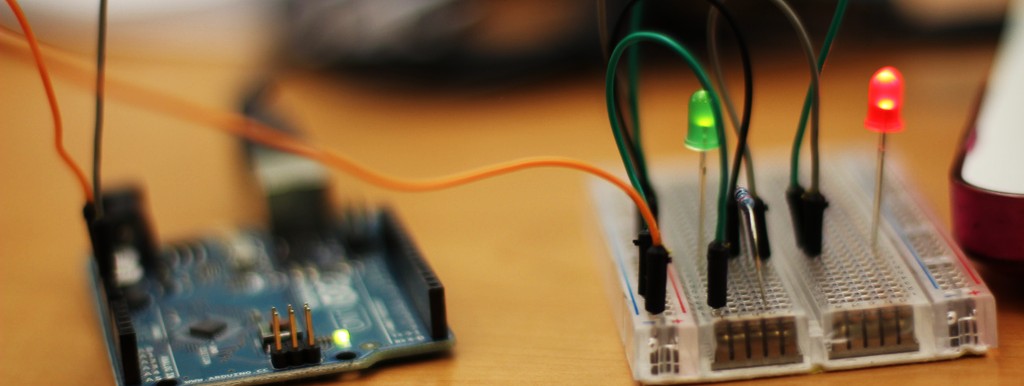IoT feels good
We have been hacking together a small Internet of Things (aka. IoT) demo with my colleagues this week. I had to come up with some ideas of what each of us good work on. Our two Tessels were the first ones to find their developers. There were still one experienced software developer left without anything to do. All I had left was an Arduino and a temperature sensor. “Could you do something with these?” I asked, and expected to get shouted at. To my surprise, she took those Hello-World-of-Arduino pieces and started to experiment. Soon we had temperature reading integrated to our project. Later on she told me that it was the single most interesting task she had worked in months. Believe me, it felt so good to hear.
 Photo “Arduino Class at TechSmith” by Betsy Weber
Photo “Arduino Class at TechSmith” by Betsy Weber
Internet of Things is the new buzzword of software business. It is an umbrella term for an idea that all devices around us gain a network connection and start to communicate with each other. Some people say that it is only a gimmick idea. I am in the camp of believers who think that those small devices can change the way how we interact with the world around us.
If you haven’t yet read this fantastic article at Wired about Disney’s new MagicBand concepts, I recommend you to do so. Disney is betting big on IoT with MagicBand. The article reveals how they want to change the Disney World experience with it. Nick Franklin, one of their development team leaders, puts it well:
What people call the Internet of Things is just a technological underpinning that misses the point. […] This is about the experiential Internet. The guest doesn’t need to know how it happened. It’s about the magic.
IoT is not really about the individual devices. It is more about the experience that we get when all those gadgets work well together. That feels good. The reason for it might be that we as humans are built around the concept of interaction. We have always had to interact with our surroundings and with each other to survive. In fact many of our biggest technological breakthroughs have been born around that desire to interact. Interaction decreases friction, and with less friction, life just feels better. Now when devices gain the same ability to interact with each other, us and our surroundings, our life feel a bit better yet again.
I have been test-driving Chromecast at home this week. As a software developer I usually know quite well what is possible with current technology. But yet the first-time experience of gadgets working together keep amazing me. Being able to send a video from a mobile device to a TV feels unbelievable. I had the same feeling in my childhood with a cordless remote controller, with a Web browser and with my dad’s GSM mobile phone. And no, it was not about the technological breakthroughs; it was about the experience of interaction.
This is technology of the future, but it is working here, today, in my living room.
But I believe there is something more in there why my colleague was so keen on hacking the Arduino, or why I am so interested in IoT in general. It is about the abstraction level of software development. That has risen quite much in the last couple of decades. We software developers do not have worry so much about low-level implementation details anymore. While it is a good thing in general, at the same time we maybe losing our touch to hardware. Software in many ways is lifeless. We like to see the results of our code somewhere, but many times the closest thing to physical world we can achieve is an UI element on the screen of a touch device. Having that Arduino next to your computer is something better. With a click of a button you can see your code blinking a LED or reading a measurement from a temperature sensor. That is physical, that is real, and that is something that you can see, touch and feel.
I just can not wait to see and experience what is possible tomorrow. But the best thing is that the ingredients, the technology, is already here today. Let’s hack.